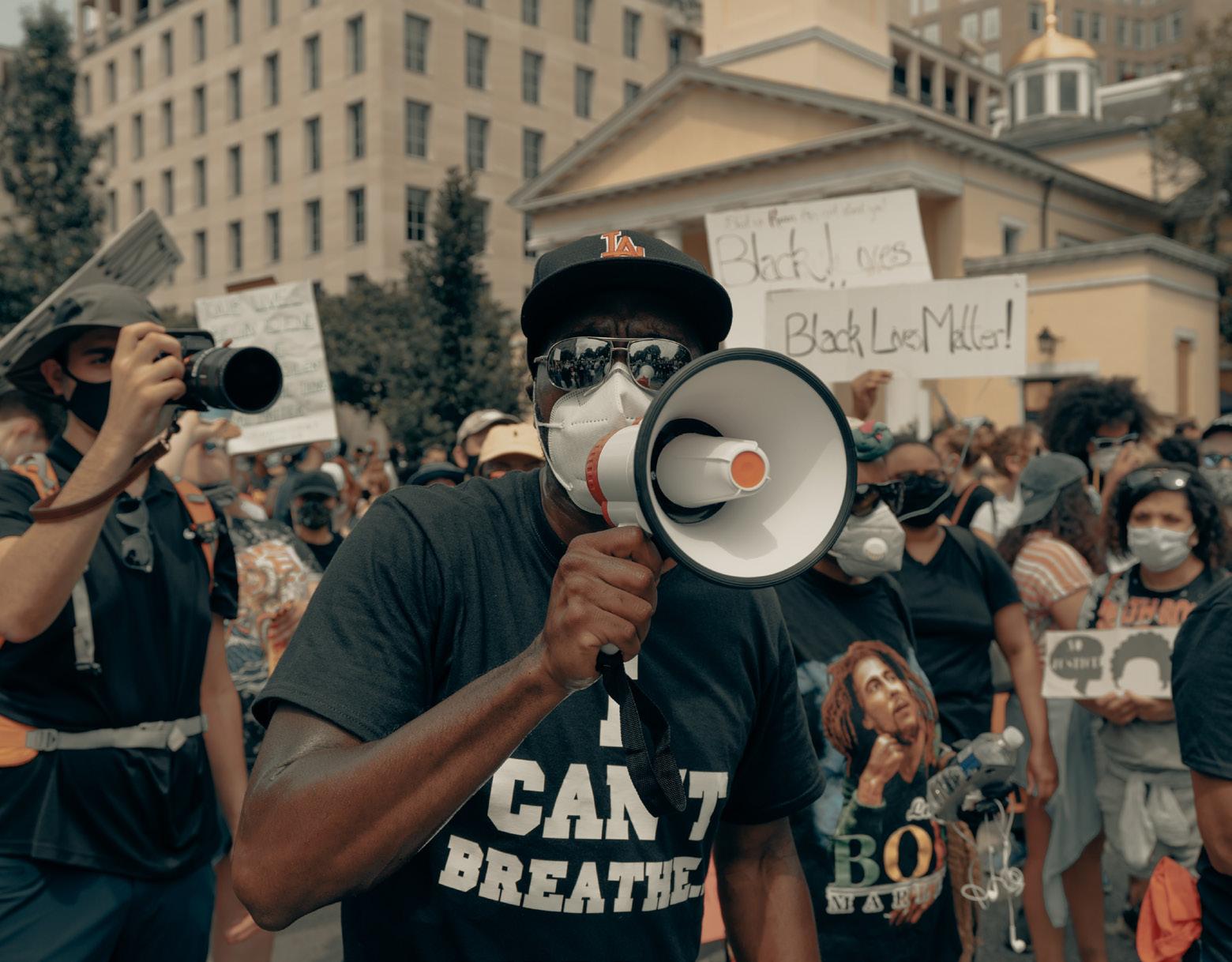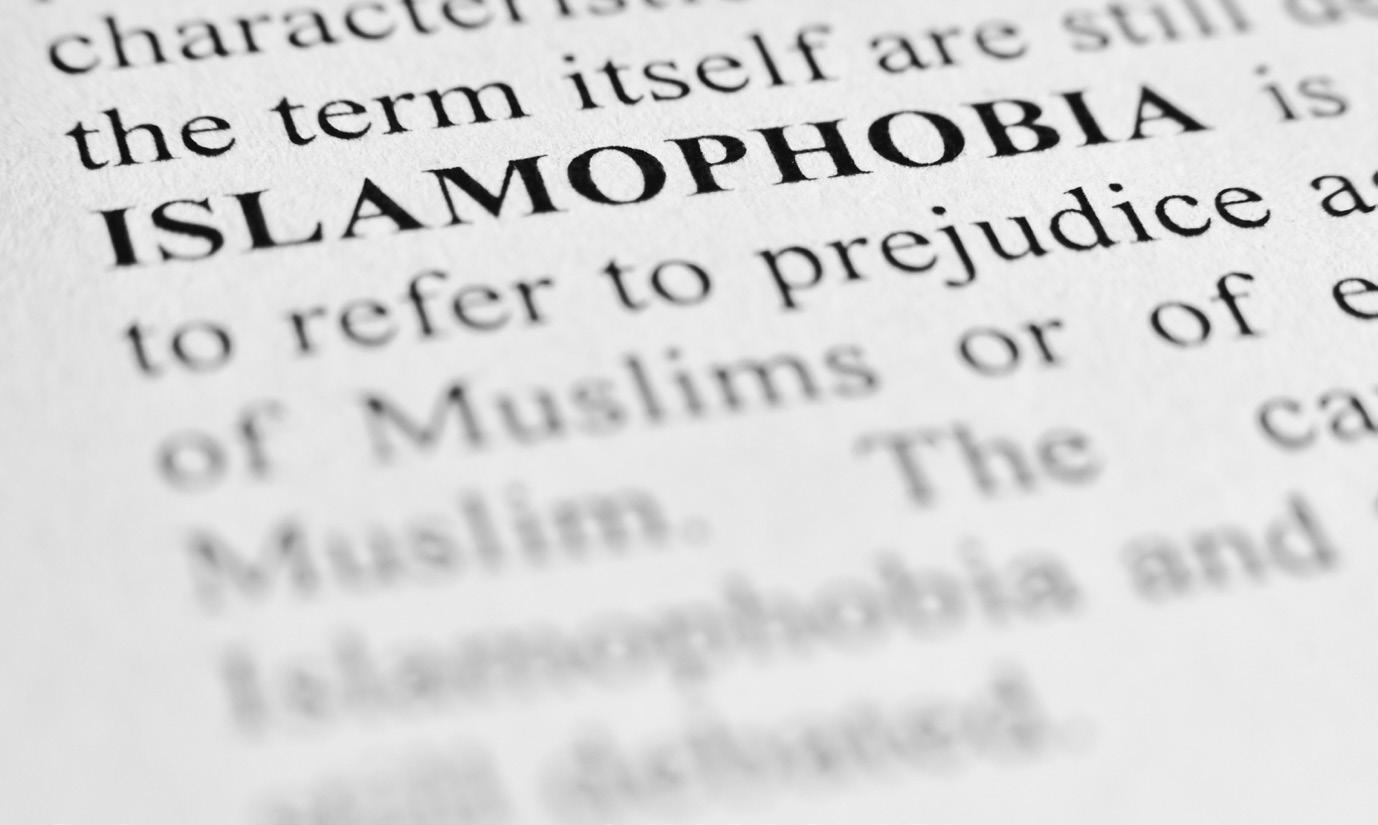
10 minute read
IS COUNTER TERORISM IN BRITAIN RACIST AND/OR ISLAMOPHOBIC?
Steven Greer, Professor of Human Rights, University of Bristol Law School, asks whether counter terrorism in Britain, particularly the Prevent programme, is racist and/or Islamophobic
The killing of George Floyd in Minneapolis on 25 May has once again graphically illustrated the problem of racism and the excessive use of force in US policing. Careful, evidence-based analysis is, however, a key prerequisite in determining its scale and scope, both there and in other places. This is no less true with respect to the claim, which dominates the relevant literature and campaigning worlds, that counter terrorism in Britain, particularly the Prevent programme, is racist and/or Islamophobic.
If true, something urgently needs to be done about it. But, if not, the allegation itself should be challenged. Otherwise cooperation with counter terrorism could be undermined and community relations damaged. But, in order to test it in a scientific manner with legally significant implications, it needs to be reframed in terms of official discrimination – the direct or indirect official allocation of goods or benefits on an unequal basis without adequate justification by reference to the rights and freedoms of others or legitimate public interests.
OFFICIAL DISCRIMINATION
Official discrimination can occur in several ways. A law or public policy is ‘discriminatory by design’ if it expressly targets a social group, particularly one with a ‘protected characteristic’, without justification. However, even if not guilty of this charge, it may, nevertheless, be discriminatory for other reasons. Well-intentioned implementation may indirectly, and inadvertently, have this effect. A non-discriminatory law or policy may also be implemented in a discriminatory manner as a result of prejudice, either by the particular agencies involved, or more randomly, on the part of specific officials.

A distinction also needs to be drawn between, on the one hand, subjective perceptions that a law/policy is discriminatory, and on the other, independent evidence that this is the case. The trouble with subjective perceptions is, that no matter how firmly or honestly held, the extent to which they are based on rumour, myth, or prejudice, rather than upon direct experience, objective fact, or reliable judgment, is difficult to determine.
British counter terrorist law and policy cannot credibly be deemed discriminatory by design because it is expressly neutral with respect to the forms of terrorism to which, and the racial and other characteristics of those to whom, it applies. And apart from anecdotes, which may or may not be true, there is also no reliable evidence that it is being regularly and intentionally implemented in a discriminatory manner. Indeed, the evidence either fails to substantiate such claims or points in the opposite direction.
TERRORISM AND COUNTER TERRORISM IN BRITAIN
From the beginning of the millennium to the end of 2019, terrorism in Britain killed over 100 people. Jihadis were responsible for over 90 per cent of these deaths and just under 100 per cent of the total casualties. By 2003 annual fatalities due to the ‘Troubles’ in Northern Ireland had declined to single figures.
Since then, although the risk from ‘dissident Republicans’ has remained deadly, this type of terrorism has caused no death or injury in E
mainland Britain. Terrorism in pursuit of other causes has also waxed and waned over the past few decades. And, while the risk from the far-right has increased significantly recently, it has not yet accounted for more than a dozen or so casualties including a handful of fatalities.
The two, putatively integrated, principal pillars of the UK’s domestic counter terrorist law and policy are the Terrorism Act 2000 – which consolidated, streamlined and reformed relevant legislation prompted by the conflict in Northern Ireland – and the four Ps of the post-9/11 CONTEST strategy: Prepare, Pursue, Protect and Prevent.

PREPARE AND PURSUE
The Prepare stream of CONTEST – which seeks to mitigate the impact of terrorist attacks by bringing them to an end as swiftly and effectively as possible, and by increasing capacity to recover in the aftermath (‘resilience’) – has, quite rightly, not been denounced as racist or Islamophobic. The majority of those arrested, charged, prosecuted, convicted and imprisoned in Britain for terrorism-related offences over the past few years, core Pursue objectives, have been young, male, non-white, British, Muslims. Since this is entirely consistent with those likely to be involved in the dominant terrorist threat, this CONTEST stream cannot credibly be considered discriminatory either.
PROTECT
Domestically, Protect is intended to reduce vulnerability to terrorism, particularly as far as national border security, transport systems, national infrastructure, and crowded places are concerned. Its most controversial feature concerns stop and search.
The Terrorism Act provides two principal street-related stop and search provisions. Section 43 requires reasonable suspicion of involvement in terrorism on the part of the police officer exercising this power. The other is provided by s. 47A (as amended). This authorises a senior police officer to designate, for up to 14 days, an area for random stops and searches, where there is reasonable suspicion, based upon intelligence, that a terrorist incident will occur there. Within such an area, uniformed officers can stop and search people and vehicles for evidence of involvement in terrorism without

themselves having reasonable suspicion. But s. 47A also provides that, unless the officer has a description of a specific suspect, a person’s physical appearance cannot be used alone or in combination with any other factor as justification. Exercise of both powers is governed by a code of practice. Amongst other things, this provides that reasonable suspicion cannot be based on generalizations or stereotypes of certain groups or categories of people deemed more likely to be involved in terrorism than others. It also requires officers to take care to avoid any form of racial or religious profiling when selecting people to search. They must also take ‘great care’ to ensure their judgment is ‘not based solely on ethnic background, perceived religion’ or any other characteristic protected by the Equality Act 2010.
No official figures appear to be available about the racial or religious impact of s. 47A which has been rarely used. There are no figures either for the religion of those stopped and searched under s. 43. However, since some 14 per cent of the population of England and Wales is non-white, the hit rate for s. 43 is 400 per million for non-whites and 40 per million for
whites. One possible interpretation is that this is discriminatory and that the ‘reasonable suspicion’ requirement and the Code are being ignored. But official discrimination is not simply a matter of numbers. It critically depends upon context and justification. The s. 47A power is expressly location-specific. And while this is not a formal characteristic of s. 43, it may also be applied more in certain places than others. Therefore, while it cannot be ruled out that counterterrorist stops and searches on the streets are racially discriminatory, the lack of vital data renders this unproven.
The amended Schedule 7 of the Terrorism Act 2000, which is also subject to a code of practice, permits ‘examining officers’ designated by the Secretary of State (usually the police) to stop and question, detain and search individuals, and to examine and seize possessions and goods, with respect to anyone transiting through ports, airports, international rail stations, or the border area between Northern Ireland and the Republic of Ireland. The purpose is to determine whether those concerned appear to be, or have been, involved in terrorism. While ‘some reasoned basis, proportionality … and good faith’ are necessary, no specific suspicion about any given traveller is required.

Official statistics reveal several things about how these powers have been exercised. First, they are also very rarely used. An average of only 0.006 per cent of the 300 million or so transiting through British airports every year are subject to such examinations. And this has also been steadily declining yearon-year, from over 61,000 in 2012 to just over 10,000 in 2019. Ninety-four per cent last less than an hour and, of those examined, 35 per cent are white and 57 per cent non-white. Four per cent are detained, 75 per cent of whom are non-white. There is no information on the religion of those stopped and searched under Schedule 7.
Here again the overrepresentation of non-whites, particularly among those detained, might suggest racial discrimination. But it can also be explained in other terms. Since 92 per cent of Muslims in England and Wales are non-white, and all jihadis are Muslim, the majority of jihadis in Britain are likely to be non-white. This is also likely to be the case globally. On the basis of intelligence assessments, Schedule 7 is also likely to be used significantly more in relation to certain flights than others. For obvious reasons, these have not been officially identified. But it is, nevertheless, well-known that the countries most afflicted by jihadi terrorism are Nigeria, Syria, Iraq, Afghanistan, and Pakistan, all of which have almost entirely non-white populations. The majority of those visiting them is also likely to be non-white. The manner in which stop and search
powers are exercised is also critical. If most are of limited duration, applied infrequently to any given individual, and conducted respectfully, there can be little cause for complaint. Here again the lack of relevant systematic evidence makes it impossible to draw reliable conclusions about racial discrimination either way.

PREVENT
Prevent, the most controversial of the four Ps, aims to stop people from becoming terrorists, or from supporting terrorism, by countering terrorist ideology and challenging those who promote it (‘counterradicalisation’), supporting cooperative individuals who are particularly vulnerable to being drawn into terrorism (‘de-radicalisation’), and working with sectors and institutions where the risk of radicalization in these senses is considered high.
Although the religion of those referred is not recorded, to an extent this can be inferred from the type of extremism concerned. And, while non-whites are overrepresented in the statistics, this is more plausibly attributable to the demography of those likely to be involved in jihadi terrorism than to discrimination. An average of just over 6,500 people are referred to Prevent every year: 50 per cent concern Islamist extremism, 17 per cent, ‘right wing extremism’, and 33 per cent, ‘other extremism’, ‘mixed, unstable or unclear ideology’. It is, however, significant that concerns about Islamist extremism account for only half the total number. Indeed, the referral figure for right wing extremism has also almost doubled from 750 in 2015/16 to just under 1,400 in 2018/19, the steepest increase of any category. The police select those deemed worthy of a decision by local authority ‘Channel panels’ (18 per cent) which then schedule suitable cases for official support (34 per cent of those considered by Channel, six per cent of initial referrals), acceptance of which is voluntary. Of these: 84 per cent are aged 30 or under, 91 per cent are male, 50 per cent involve Islamist extremism (37 per cent in 2018/19), 39 per cent the extreme right (45 per cent in 2018/19), and 11 per cent other and mixed etc. Ninety-four per cent of initial referrals are filtered out of the programme or diverted to other services without receiving Channel support and 81 per cent leave Channel without further official concern. The cases of those who have left Channel are officially reviewed. Typically, only five per cent are re-referred where concerns have arisen that the risk of radicalization has again materialized. The Prevent programme is scheduled for independent review. But the identity of the reviewer, and the timetable, are yet to be decided.
ONE FINAL CHALLENGE
Those who maintain that counter terrorism in Britain is racist and/or Islamophobic face one final challenge – explaining how jihadi terrorism can be tackled without impacting more upon Muslims and non-whites than upon anyone else, and how right wing terrorism can be tackled without the same effect upon white, non-Muslims. L
FURTHER INFORMATION
www.legalresearch.blogs.bris.ac.uk










